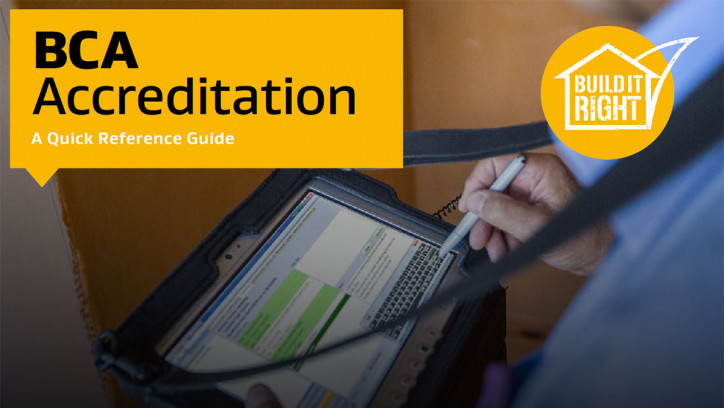Detailed regulatory guidance on the BCA accreditation scheme
The Ministry of Business, Innovation and Employment (MBIE) has developed detailed regulatory guidance for the building consent authority (BCA) accreditation scheme. You can access the guidance, and minimum standards and criteria for each regulation, to better understand the accreditation requirements of the scheme.
Amendment to the BCA Accreditation Regulations
The following regulation changes came into force on 22 August 2025.
Introducing Regulation 7A
Regulation 7A requires that the policies and procedures that a building consent authority (BCA) has in place for planning, performing, and managing inspections must ensure that a minimum of 80 per cent of inspections are carried out within the period of three working days after the date for inspection requested by the building owner or their agent.
As a result of this change, MBIE’s online accreditation guidance has been updated to add a new page for Regulation 7A that provides guidance on meeting the accreditation requirement. It includes example inspection booking scenarios that show how to count the three working day timeframe.
In addition to the new Regulation 7A guidance, the below pages of the guidance have been amended to incorporate Regulation 7A. BCAs will need to assess whether policies, procedures and systems (PPS) required under these Regulations are sufficient to support delivery of inspections within the required timeframe.
Regulation 7A – Inspection requirements
Regulation 5
Guidance has been amended to clarify that the Regulation 5 requirement for PPS to be documented, appropriate for purpose and consistently and effectively implemented includes Regulation 7A requirements.
Regulation 5 – Requirements for policies, procedures and systems
Regulation 7 and 7(2)(a)
The guidance for Regulation 7 has been updated to include that the PPS a BCA is required to have must include the booking of inspections in addition to the planning, performing and managing of inspections.
Regulation 7 – Performing building control functions
For Regulation 7(2)(a)(iii), guidance has been updated to include that information about how building work is inspected must cover inspection requirements, including how to make bookings and the requirement for at least 80 per cent of inspections to be carried out within three working days after the date for inspection requested.
Regulation 7(2)(a)(iii): how work is inspected
Regulation 7(2)(e)
Guidance has been updated to cover that Regulation 7(2)(e) policies and procedures, for planning (booking), performing and managing inspections, must ensure compliance with Regulation 7A when implemented. The guidance now also provides a link to MBIE’s Remote Inspection guidance.
Regulation 7(2)(e) – Planning, performing, and managing inspections
Regulation 8
Guidance for Regulation 8 has been updated to include forecasting for recruitment (ensuring there are sufficient inspectors) as an example of a way to meet inspection performance requirements.
Regulation 8 – Ensuring enough employees and contractors
Regulation 9
Amended guidance clarifies that ‘accepting and making inspection bookings in accordance with Regulation 7A’ is not subject to the requirements of Regulation 9.
Regulation 9 – Allocating work to competent employees or contractors
Glossary of terms and abbreviations
Definitions have been added for remote inspection (RI), inspection wait time (IWT), date inspection requested (DIR) and date inspection done (DID).
Definition of remote inspection (RI), inspection wait time (IWT), date inspection requested (DIR).
The regulatory guidance has been developed to support understanding of the Building (Accreditation of Building Consent Authorities) Regulations 2006 (the Regulations).
An applicant must be able to meet, and a BCA must be able to maintain compliance with, all the regulatory requirements of the scheme detailed in the Regulations and this regulatory guidance from this time.
To use this guidance, go to the regulatory requirement you require further information about. The regulatory guidance will outline the objective of the Regulation and the minimum standards and criteria necessary to comply with it. There are also helpful notes to guide the accreditation assessment process.
Where more help or information is needed, interested parties can contact MBIE. There is a process for requesting advice or further regulatory guidance.
Building (Accreditation of Building Consent Authorities) Amendment Regulations 2025 - legislation.govt.nz
Building (Accreditation of Building Consent Authorities) Regulations 2006 - legislation.govt.nz
How to request further advice or regulatory guidance has more information.
BCA accreditation quick reference guide
This guide lists the accreditation regulations for business as usual, your annual review and two-year assessment.
Checklists for the minimum criteria that must be met to become an accredited organisation or BCA.Checklists for BCA accreditation regulatory guidance
The status of the regulatory guidance
MBIE has taken care in preparing the regulatory guidance and intends that it can be relied upon by applicants, accredited organisations and BCAs, and the accreditation body appointed by MBIE’s Chief Executive under section 248 of the Building Act 2004.
The minimum standards and criteria in the regulatory guidance are those which the accreditation body will use to undertake accreditation assessments. The accreditation body will make a finding of non-compliance where an applicant, accredited organisation or BCA does not have policies, procedures or systems consistent with the minimum criteria, or where those policies, procedures and systems have not been consistently and effectively implemented.
